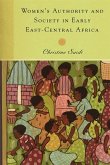Helena Michie takes the notion of 'otherness' as it has traditionally been used by Simone de Beauvoir and other feminists to designate the space between men and women, and transcribes it instead to the places between and among women. Its goal is to describe women's relations to each other and how these relations have been textually and culturally represented.
This book looks at how differences among women have been textually represented at a variety of historical moments and in a variety of cultural contexts ranging from Victorian mainstream fiction to African-American mulatto novels, from late twentieth-century lesbian communities to contemporary country music. Michie uses the term "sororophobia" to describe the negotiation of sameness and difference, of identity and separation, among women of the same generation, encompassing the desire for, and at the same time, the recoil from identification with, other women. Arguing that the generic "woman" suggests a connection between women which transcends race, class, and other differences, she shows how it also translates all too easily into a master-category of gender which obscures or denies the basic differences between individual women. Exploring how the language of feminism has contributed to the confusion through a dependence on the concept of the family--in its entanglement with the figures of the sister and mother--Michie calls attention to the problematic metaphor of a literal sisterhood of accord, and advocates a move outside the family to look at a figure excluded from that prescribed structure, the "other woman". She argues for the centrality to feminism of a paradigm that moves beyond celebrations of identity and sisterhood to a more nuanced notion of women's relations with other women which may include such uncomfortable concepts as envy, jealousy, and competition as well as more institutionalized ideas of difference such as race and class. Each of the chapters deals with a different impersonation or embodiment of the other woman and with the process by which that otherness iscreated. Chapters on literature are interspersed with "inter-chapters" on the choreography of sameness and difference among women in popular culture, Sororophobia represents a fresh perspective on the complex and shifting relations between women's attempts to identify with other women and their often simultaneous desire to establish and retain difference.
This book looks at how differences among women have been textually represented at a variety of historical moments and in a variety of cultural contexts ranging from Victorian mainstream fiction to African-American mulatto novels, from late twentieth-century lesbian communities to contemporary country music. Michie uses the term "sororophobia" to describe the negotiation of sameness and difference, of identity and separation, among women of the same generation, encompassing the desire for, and at the same time, the recoil from identification with, other women. Arguing that the generic "woman" suggests a connection between women which transcends race, class, and other differences, she shows how it also translates all too easily into a master-category of gender which obscures or denies the basic differences between individual women. Exploring how the language of feminism has contributed to the confusion through a dependence on the concept of the family--in its entanglement with the figures of the sister and mother--Michie calls attention to the problematic metaphor of a literal sisterhood of accord, and advocates a move outside the family to look at a figure excluded from that prescribed structure, the "other woman". She argues for the centrality to feminism of a paradigm that moves beyond celebrations of identity and sisterhood to a more nuanced notion of women's relations with other women which may include such uncomfortable concepts as envy, jealousy, and competition as well as more institutionalized ideas of difference such as race and class. Each of the chapters deals with a different impersonation or embodiment of the other woman and with the process by which that otherness iscreated. Chapters on literature are interspersed with "inter-chapters" on the choreography of sameness and difference among women in popular culture, Sororophobia represents a fresh perspective on the complex and shifting relations between women's attempts to identify with other women and their often simultaneous desire to establish and retain difference.








